Novichok attack suspects gave revealing TV interview
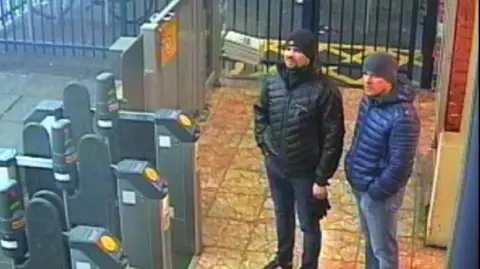 Metropolitan Police
Metropolitan PoliceKey suspects believed to be involved in the Salisbury nerve agent poisoning took part in a revealing Russian TV interview, an inquiry has been told.
Commander Dominic Murphy, head of the Metropolitan Police's Counter Terrorism Command, gave evidence on Wednesday to the inquiry into the death of Dawn Sturgess.
Nobody has been charged for Ms Sturgess's death after she came into contact with Novichok in 2018, but suspects have been charged for the attempted murder of ex-Russian spy Sergei Skripal and his daughter Yulia.
The Kremlin has always denied involvement in the poisonings.
Commander Murphy said it had been a "very challenging investigation to lead" and "of a scale and complexity that I'm not sure we have seen before", even with the experience of the Litvinenko investigation.
The inquiry was shown 25 minutes from an interview from Russia Today with suspects Ruslan Boshirov and Alexander Petrov. These were aliases, with their real names later revealed to be Alexander Mishkin and Anatoliy Chepiga.
At the time, the interview became famous after the pair talked about seeing the 123m metre spire in Salisbury.
Commander Murphy told the hearing that to call their appearance a surprise was a "slight understatement".
"It was quite a shocking thing to see and unexpected, but equally for various reasons quite welcome for them to go on TV like that," he said.
Their interview was used to help investigators confirm it was them in CCTV pictures.
The pair also shared information about their potential movements, which police used in their investigations.
However, the commander said their account was "very different from the movements we actually saw" and was nothing like those a tourist might follow.
The men suggested that they could not use public transport because of wintry conditions - but they had for their journey to and from Salisbury.
The inquiry has been considering the interview as part of a disinformation campaign from Russia - something Commander Murphy said had been seen previously, such as in the Litvinenko inquiry.
He said that from the "very start" senior members of Russia's political system had made comments seeking "to distance them from any involvement in what was happening".
It was suggested it had been conducted by the UK to be able to blame Russia "as part of a sort of bizarre and surreptitious intelligence operation of some variety", he added.
He said that the television interview was the same format, suggesting there were "alternative explanations for the things we were saying".
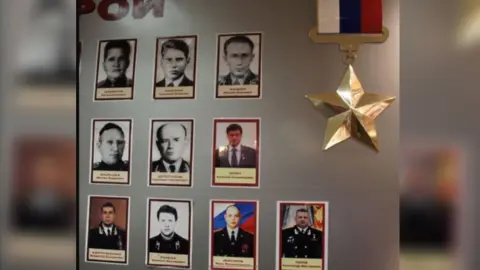 Dawn Sturgess Inquiry
Dawn Sturgess InquiryWorking out real identities
The inquiry has been hearing more detail about how the true identities of the suspects were uncovered.
It involved a lot of inconsistencies in visa applications, photographs, financial documents, bank details and employment history.
Boshirov's real identity was believed to be Anatoliy Vladimirovich Chepiga.
This was discovered in a few different ways. It was explained to the inquiry that an image of Chepiga bearing "a strong resemblance to Boshirov" was pictured on a "wall of heroes" at a military school in the town of Blagoveshchensk, east Russia.
He was also believed to have been spotted in photos from the wedding of the daughter of Russian military intelligence (GRU) leader Andrei Averyanov.
"Importantly, whilst the individual that appears to be Boshirov is at the wedding, the Boshirov name does not feature in the table plan," added the Commander.
Boshirov and Petrov had replicated details, including account numbers and bank balances, on separate visa applications.
Commander Murphy said reporting by the investigative group Bellingcat "helped us to understand who Chepiga really was".
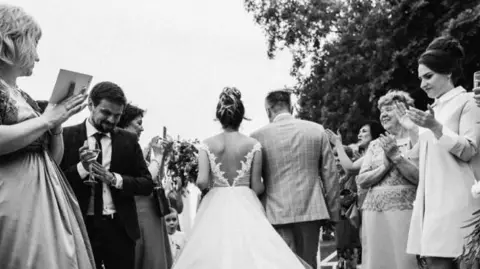 Dawn Sturgess Inquiry
Dawn Sturgess Inquiry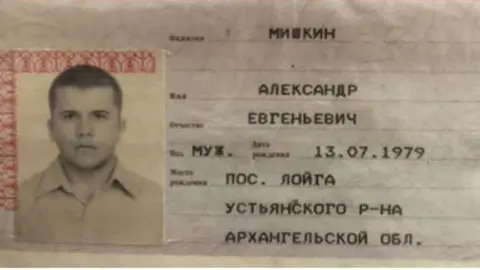 Bellingcat/PA
Bellingcat/PASuspects tried to use as much original detail as possible in applications "so they're able to remember it".
Petrov's real identity was believed to be Alexander Mishkin, who worked as a doctor for the GRU.
Passports in the name of Petrov and Mishkin both had the same date of birth, 13 July 1979, and the same place of birth, Arkhangelsk.
Discussing GRU unit 29155, of which Petrov and Boshirov are believed to be members, Commander Murphy said it was "frequently reported to have been involved in operations across the world".
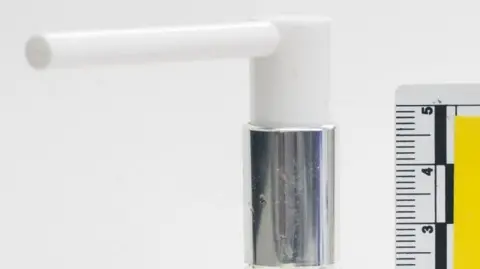 Metropolitan Police
Metropolitan Police'Unusual' perfume bottle
Commander Murphy also went into more detail about the perfume bottle found with Novichok inside, described as "similar in size to a cigarette box".
It was branded as Nina Ricci and picked up by Ms Sturgess's partner in a sealed bag before it was opened and Ms Sturgess sprayed a fatal dose.
The commander said neither the box and bottle were genuine and the nozzle put on the bottle was "extremely unusual" and designed to distance the operator from its contents.
He was also asked about if the Novichok that poisoned Ms Sturgess could have come from anywhere else.
The commander said there is "no evidence whatsoever" that the Russians had the nerve agent in the country already for anything else, so it is his belief it was discarded by the suspects after poisoning the Skripals.
The Russian government has always denied any involvement in the poisonings in Salisbury and the inquiry continues.

BBC Sounds: Salisbury Poisonings
Keep up to date with the latest from the inquiry with our podcast.
Listen to the episode on BBC Sounds.

Follow BBC Wiltshire on Facebook, X and Instagram. Send your story ideas to us on email or via WhatsApp on 0800 313 4630.
